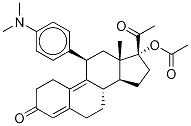Ulipristal acetate (UPA) is a selective progesterone receptor modulator. Attributing to its higher efficacy and a similar rate of side effects compared to levonorgestrel emergency contraception, it is now recommended as first line treatment for emergency contraception. Emergency contraception is defined as the use of drug or device after unprotected or under-protected intercourse to prevent an unwanted pregnancy. Ulipristal acetate can be used up to 5 days (120 h) after unprotected sexual intercourse.
As progesterone promotes the growth of uterine fibroids, the blocking characteristic of ulipristal acetate can thereby be used to reduce the size of uterine fibroids. Ulipristal acetate has also shown efficacy with a significant reduction in uterine bleeding caused by uterine fibroids. The treatment of fibroids by ulipristal acetate should begin in the first week of a menstrual period.
Drugs or herbal products that induce enzymes, including CYP3A4, such as carbamazepine, phenytoin, rifampin, St. John's Wort, etc., may decrease the plasma concentrations of ulipristal acetate, and may decrease its effectiveness while CYP3A4 inhibitors such as itraconazole, ketoconazole, etc., may increase plasma concentrations of ulipristal acetate.
The half-life after oral intake is 32 h; it binds to plasma proteins for 97–99%, and it is metabolized by the citochrome P450.

